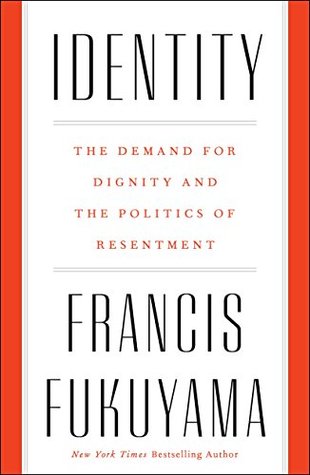More on this book
Community
Kindle Notes & Highlights
Read between
March 27 - March 31, 2020
Thymos is the part of the soul that craves recognition of dignity; isothymia is the demand to be respected on an equal basis with other people; while megalothymia is the desire to be recognized as superior. Modern liberal democracies promise and largely deliver a minimal degree of equal respect, embodied in individual rights, the rule of law, and the franchise. What this does not guarantee is that people in a democracy will be equally respected in practice, particularly members of groups with a history of marginalization. Entire countries can feel disrespected, which has powered aggressive
...more
president. But it is not at all inconsistent with the general argument I was making about potential future threats to liberal democracy, and the central problem of thymos in a liberal society.6 Such
Twentieth-century politics had been organized along a left–right spectrum defined by economic issues, the left wanting more equality and the right demanding greater freedom. Progressive
The left has focused less on broad economic equality and more on promoting the interests of a wide variety of groups perceived as being marginalized—blacks, immigrants, women, Hispanics, the LGBT community, refugees, and the like. The right, meanwhile, is redefining itself as patriots who seek to protect traditional national identity, an identity that is often explicitly connected to race, ethnicity, or religion.
politics. Identity grows, in the first place, out of a distinction between one’s true inner self and an outer world of social rules and norms that does not adequately recognize that inner self’s worth or dignity. Individuals throughout human history have
A clear line ran from Nietzsche’s work Beyond Good and Evil to the assertion by U.S. Supreme Court justice Anthony Kennedy, in the 1992 decision Planned Parenthood v. Casey, that liberty is “the right to define one’s own concept of existence, of meaning, of the universe, and of the mystery of human life.”6
Most people do not have infinite depths of individuality that is theirs alone. What they believe to be their true inner self is actually constituted by their relationships with other people, and by the norms and expectations that those others provide. A person living in Barcelona who suddenly realizes her real identity is Catalan rather than Spanish is simply excavating a lower layer of social identity that has been laid down beneath the one nearer to the surface.
Identity also became a critical issue in the then-colonial world. The parts of Asia, Africa, and Latin America dominated by the European powers were not as a whole industrializing as Europe was. They were instead going through what has sometimes been labeled modernization without development—that is, urbanization and rapid social change without sustained economic growth. They acquired new capital cities with a small indigenous elite that collaborated with the colonial powers in administering their territories. Members
The French Middle Eastern scholar Olivier Roy has pointed out that many recent terrorists, such as those who staged the Bataclan attacks in Paris in 2015, have a similar background: they are second-generation European Muslims who have rejected the Islam of their parents. (About 25 percent of the new generation of jihadis are converts to Islam with personal stories similar to those of jihadis who were born Muslim.)7 In their early years they appeared to be westernized, drinking alcohol and smoking weed, dating girls, watching sports, and otherwise seeming to fit into their surroundings. Yet
...more
members. A liberal society increasingly came to be understood not just as a political order that protected certain minimal individual rights, but rather as one that actively encouraged the full actualization of the inner self.
Things do not have to be this way. National identities can be built around liberal and democratic political values, and the common experiences that provide the connective tissue around which diverse communities can thrive. India, France, Canada, and the United States are examples of countries that have tried to do this. Such an inclusive sense of national identity remains critical for the maintenance of a successful modern political order for a number of reasons.
A liberal democracy is an implicit contract between citizens and their government, and among the citizens themselves, under which they give up certain rights in order that the government protects other rights that are more basic and important.
Two types of argument underpin this school. The first is economic and functional, saying that problems today are global in scope and therefore need to be addressed globally. Such issues range from trade and investment to counterterrorism, the environment, infectious diseases, narcotics, human trafficking, and many others. Nations and national identities are potential obstacles to international cooperation and need to be gradually superseded by a new layer of transnational rules and organizations. The second strand of argument is more theoretical and comes out of international human rights law.
...more
changeable, however. While some individuals may persuade themselves that their identity is based on their biology and is outside their control, the condition of modernity is to have multiple identities, ones that are shaped by our social interactions on any number of levels. We have identities defined by our race, gender,
In addition to changing the formal requirements for citizenship, European countries need to shift their popular understandings of national identity away from those based on ethnicity. In the early 2000s, a German academic of Syrian origin named Bassam Tibi proposed Leitkultur, “leading culture,” as the basis for German national identity.3 Leitkultur was defined in liberal Enlightenment terms as belief in equality and democratic values. Yet his proposal was attacked from the left for suggesting that those values were superior to other cultural values; in doing so the left gave unwitting comfort
...more
Americanism constituted a set of beliefs and a way of life, not an ethnicity; one can deviate from the former but not the latter.


